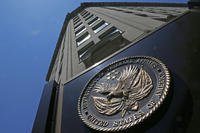The U.S. Naval Academy may continue using race in its admissions process, a federal judge ruled Friday, brushing back an attempt by a group that had successfully overturned affirmative action in college admissions to extend that to the Annapolis-based military academy.
"Over many years, military and civilian leaders have determined that a racially diverse officer corps is a national security interest," U.S. District Judge Richard D. Bennett wrote in his ruling. "The Naval Academy has established a compelling national security interest in a diverse officer corps in the Navy and Marine Corps."
The president of Students for Fair Admissions, which had sued the Naval Academy in October 2023 three months after it won its case against Harvard College and the University of North Carolina in the U.S. Supreme Court, expressed disappointment in the ruling and vowed to appeal.
"SFFA will appeal this to the appellate court," Edward Blum said in a statement. "If we are unsuccessful there, then we will appeal to the U.S. Supreme Court.
"It is our hope that the U.S. military academies ultimately will be compelled to follow the Supreme Court's prohibition of race in college admissions," he said.
But the Supreme Court ruling in SFFA's favor included a footnote specifying that the ruling didn't address military academies because of their "potentially distinct interests."
"The record in this case demonstrates the wisdom of that caution," Bennett said in his decision. "The admissions policies of Harvard College and the University of North Carolina placed these civilian universities in the maelstrom of our Nation's continued struggle with race. "It is in this environment that the U.S. Naval Academy seeks to perform its mission to prepare its students to become officers in the U.S. Navy and Marine Corps."
Bennett served over 20 years in the U.S. Army Reserve and Maryland National Guard.
CDR Ashley Hockycko, a Naval Academy spokesperson, said in a statement the academy is "aware of the ruling in the case brought forth by Students for Fair Admissions and are reviewing the court's decision."
The ACLU filed a brief in the Naval Academy case on behalf of the National Association of Black Military Women underscoring the importance of racially diverse officers across the armed forces. The brief also expounded upon the history of racism in the military, and its enduring impact.
"Today's decision affirms the importance of access and opportunity to create a racially diverse military corps," Leah Watson, senior staff attorney in the ACLU's Racial Justice Program, told The Baltimore Sun. "The importance of a racially diverse military corps is an ideal that has been consistently recognized by the highest military officials for decades."
If a diverse class is not admitted to the Naval Academy one year, 30 years later the candidates for the highest military positions would not be diverse either, Watson said.
In his opinion, Bennett added that military leadership continues to be less diverse than the enlisted forces they command and that officials are working to remedy that through outreach efforts. And, Bennett wrote, race is only one factor, considered in limited circumstances, during an admissions process that is more complicated than for a non-military academy.
"The U.S. Naval Academy does not set any racial quotas or engage in racial balancing in its admissions process. No candidate for admission is admitted based solely on his or her race," Bennett wrote. "However, the Academy is distinct from a civilian university and its admissions process is far more complex."
The Naval Academy did not respond immediately to a request for comment.
© 2024 Baltimore Sun.
Visit baltimoresun.com.
Distributed by Tribune Content Agency, LLC.









